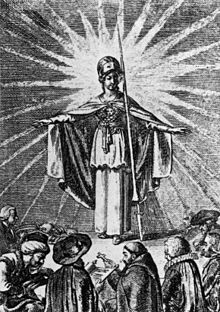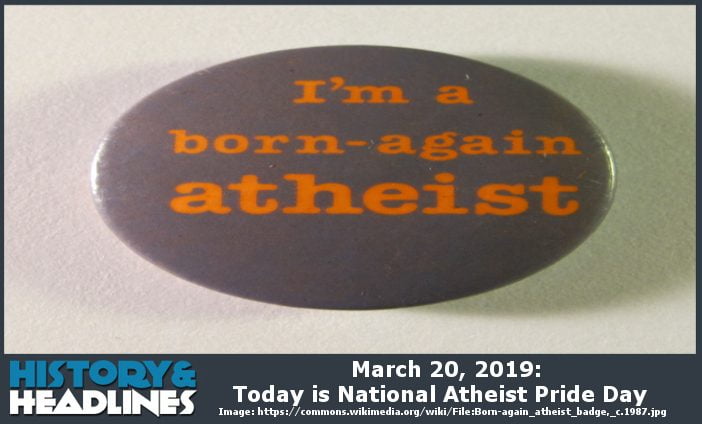A Brief History
On March 20, 2019, we take a plunge into one of the forbidden subjects, that of atheism. With Atheist Pride Day being celebrated on March 20 AND June 6 annually, atheists must feel the need for 2 days, maybe making up for the cornucopia of religious holidays each year. Atheists often hide their true feelings and thoughts on the subject of religion to avoid social ostracism, so exact numbers of atheists are hard to pin down due to reluctance to admit such an idea publicly.
Digging Deeper
Poll takers claim there are about 11% to 13% of the world’s population in the atheist camp, while in the United States about 16% of the population either claims to be an atheist or expresses “none” when asked for their religion. In China, a whopping 61% report being atheists, and that is a lot of Chinese! If you do not already know, an atheist is a person that does not believe in any sort of “God.” (An “agnostic” is a person that does not believe there is a “God,” but admits to not knowing for certain that there is not a deity of some kind.)

While many atheists/non-believers keep their opinions to themselves, some are quite open about their lack of belief in a God. These brave people sport “Darwin” emblems on the back of their cars (a fish outline similar to the one Christians display, but with feet and a smiley face signifying the theory of Evolution). Others may display more overt bumper stickers, or like some famous television personalities make it a point to pontificate about atheism on screen. Some of these public figures and entertainers include the late George Carlin, Bill Maher, Bill Nye the Science Guy, Neil deGrasse Tyson, Daniel Radcliffe, Keira Knightley, Julianne Moore, Javier Bardem, Paul Giamatti, Penn Jillette, Seth MacFarlane, Hugh Laurie, the late Katharine Hepburn, Jodie Foster, Billy Joel, James Cameron, Emma Thompson, Richard Branson, Ian McKellen, the late Andy Rooney, Ricky Gervais, Kathy Griffin, Kurt Vonnegut, Douglas Adams, Isaac Asimov and a bajillion others. Famous writers espousing atheism include Christopher Hitchens and Richard Dawkins. You will not find many politicians on this list, because while it has become more accepted to announce one’s atheism, the majority of the electorate (in the United States) are believers in some sort of religion and would almost certainly reject an atheist candidate for political office. (Usually.) Other famous scientists rejecting religion include Stephen Hawking and Peter Higgs. Writer and darling of the capitalist conservatives, Ayn Rand, was born into a Jewish family but is an avowed atheist.
Back when it was not cool, even dangerous to express one’s atheism, some prominent historical figures were covertly atheists, including but not limited to Napoleon Bonaparte (the French Revolution sought to displace religion with “Reason”), some of our US Presidents (John Adams, John Q. Adams, Thomas Jefferson, and yes, Abraham Lincoln who explicitly said so in a letter prior to being elected president) and Albert Einstein. Many of those listed here made some reference to “Providence,” a “Creator,” or something similar at some time or another, but quite possibly merely to express themselves in the vernacular of the day so to be understood, or maybe even to deflect potential ostracism for expressing their true beliefs. Some leaders have used phony religious “beliefs” to manipulate the public, notably Napoleon Bonaparte and Joseph Stalin. (And maybe a bunch of American politicians?)

While some atheists energetically seek to destroy any and all religious belief, others are content to believe what they believe and let it go at that. In fact, many religious people are also content to let others believe what they want, while some believers will drive you nuts trying to convert you to whatever religion they are selling. People are people!
So how does one celebrate Atheist Pride Day? I guess the “Pride” thing implies an atheist must somehow announce his or her atheism and revel in the (lack of) glory that brings, perhaps slap some atheist graffiti on the back of a truck or get one of those atomic symbols used to identify atheists and prominently display it on their house or car. Or perhaps just hold discussions on the subject of to believe, or not to believe. Or read books on the subject.

One word of caution when it comes to brazenly displaying whatever your religious or political beliefs are: Wearing a provocative T-shirt or displaying your beliefs on the bumper of your car can invite those of contrary beliefs to discriminate against you (think traffic enforcers!) This goes for believers and non-believers alike. Unless you know every potential vandal and traffic cop in your area agrees with your political and religious beliefs, you might think twice about displaying those beliefs on your car! (I’m just sayin’…)
We at History and Headlines are generally inclined to agree with the idea of respecting and tolerating other people’s beliefs. How about you? (Note that we include sources both for and against atheism.)

Question for students (and subscribers): Is atheism also a religion? What percentage of the American population do you believe is really atheist? Please let us know in the comments section below this article.
If you liked this article and would like to receive notification of new articles, please feel welcome to subscribe to History and Headlines by liking us on Facebook and becoming one of our patrons!
Your readership is much appreciated!
Historical Evidence
For more information, please see…
Baxendale, Toby. Against Atheism: The Case for God (Volume 1). CreateSpace, 2015.
Dobbins, Mike. The Case Against Atheism. CreateSpace, 2013.
Navabi, Armin. Why There Is No God: Simple Responses to 20 Common Arguments for the Existence of God. Atheist Republic, 2014.
Wadi, Adam. Atheism For Muslims: A Guide To Questioning Islam, Religion, And God For A Better Future. Amazon Digital Services, 2017.
Williams, Albert. Why Our Children Will Be Atheists. Amazon Digital Services, 2014.
The featured image in this article, a photograph of a small-sized round badge, displaying the slogan ‘I’m a born-again atheist’, is ineligible for copyright and therefore in the public domain because it consists entirely of information that is common property and contains no original authorship.


